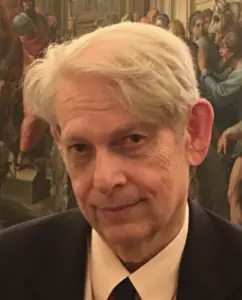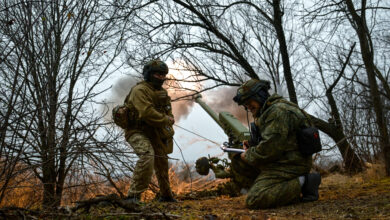
Winston Churchill said that a leader who enjoys the gift of oratory “wields a power more durable than that of a great king.” Ukraine President Volodymyr Zelensky is proving at least that bon mot from the late British icon correct, although examining how Zelensky has enabled Ukraine to seize control of the narrative in fighting the Russians goes deeper than that.
He’s used his narrative of victimhood externally to marshal support from NATO and other nations for weapons and political support. He’s used it internally to rally outgunned Ukrainians into a unified national effort and inspired the conviction that Ukraine can, as it must, prevail.
This conflict is about information as much as kinetic warfare. Zelensky understands that and is playing the role of president to the hilt. Battles are won in the heart, but warfare is fought by balancing values, historical experience, ideals, and practical reality. Zelensky has balanced these adroitly.
He intuitively grasps the nature of information warfare: the use of information and electronic communication technology to conduct warfare, and how to use it.
Strategic Communications
No one, least of all Vladimir Putin, expected such a performance. Educated as a lawyer, Zelensky achieved fame as the star of a TV comedy, Servant of the People, in which a school teacher who denounces corruption wins the presidency. The show gained high popularity, but no one took Zelensky seriously except as a showbiz star.
Fiction became reality. Forming a new political party, Zelensky won an upset victory over billionaire oligarch Petro Poroshenko, famous for selling chocolate candy.
Until Putin invaded Ukraine, critics dismissed Zelensky as a lightweight, which shows you can’t judge a leader’s mettle until they confront a life-and-death crisis.

Intuitively, he understood how to use strategic communication tactics to wage information warfare and create strategic effects. Strategic communication is the use of words, actions, images, or symbols to influence opinion to shape behavior to achieve defined effects, or, in military jargon, “end-states.” Zelensky uses all of them brilliantly.
Aided by his media colleagues, Zelensky has demonstrated pluck and both physical and mental courage. Telling the White House he needed “ammunition, not a ride,” he remained in the presidential quarters in Kyiv with his family as Russian troops tried to storm the place. His action sent a powerful message of leadership.
Freedom
Zelensky forged his narrative on the go. Speaking to his nation every day, his actions boosted morale and created unity with himself as the face of Ukraine, while his on-target rhetoric has championed freedom.
Freedom is the key value. Too often, Western politicians talk about democracy and upholding a rule-based international order. But democracy is a process, not a value.
The US and most NATO nations are not democracies. The US is a democratic republic. Others are forms of parliamentary democracy, while France is a hybrid. Many nations view the US discourse about a rules-based order as a shorthand for the US making the rules and demanding that other nations do what it orders.
Zelensky echoes John F. Kennedy and Franklin Roosevelt: his cause is freedom. Freedom from violence, tyranny, genocide, want. He stands for sovereignty, freedom of expression, and an independent Ukrainian cultural identity.
Resilience and Fortitude
As Kyiv survived the first day of the onslaught, dressed in army T-shirts – which became a trademark image and symbol – Zelensky appeared with members of his cabinet on the streets to make a simple but powerful declaration: “We’re all here. Defending our independence and our country.”
He called roll. Ukrainians and the world witnessed in real time the emergence of a strong leader, principled and brave.
He made trips to the front and shared food with the troops, reinforcing the narrative of resilience and fortitude in the face of aggression. Like Churchill, Zelensky embodied the spirit of a free nation. He used that to engage with parliaments, the UN, and others globally.
Seizing the moral high ground as a champion for freedom, he pleaded for weapons, a unified anti-Russian front, and like Churchill, made the case for why Ukraine’s victory mattered beyond its own borders, to all nations who value freedom.

He lacks JFK’s eloquence, manifested in JFK’s deeply moving Berlin speech, as powerful today as when first spoken. Yet Kennedy, who communicated to the world a sense of American idealism that only Ronald Reagan has matched – how many US Presidents could fill a square in Berlin with 300,000 cheering citizens – would have been proud.
Kennedy’s enjoinder against Russian repression applies as freshly today as in 1963. Zelensky has picked up the torch and carries it proudly and shrewdly. He has made the world experience the conflict as Ukrainians have, casting the stakes as nothing less than the survival of national identity and culture.
He communicates, as one writer put it, “integrity and humanity,” values that contrast starkly with Putin’s club-footed brutality. His notion of Ukrainian identity exposes the shallow quality of Putin’s third-rates efforts as a historian.
National Resilience
Zelensky leaves military decisions to military professionals and focuses on his core strengths: maintaining control of the narrative, defining the stakes, and explaining what this conflict is about.
He has been pithy while summoning the world to higher ideals. Addressing the Grammy awards, he commented that “our musicians wear body armor instead of tuxedos.” His language and image effectively evoke themes of protest and national resistance.
It’s worth quoting Churchill again, who perhaps best expressed the current Ukrainian spirit of resolution and defiance. Warning the Canadian Parliament that the Nazis have “sown the wind; let them reap the whirlwind,” Churchill reminded his audience of the warning given that “in three weeks England will have her neck wrung like a chicken.”
Putin must have believed the same thing about Ukraine. And so it goes. As Churchill sardonically commented: “Some chicken; some neck.”
The Ukraine conflict is about control of the narrative as much as armed conflict, and Zelensky’s adroit leadership has seized the initiative and given his nation and its citizens hope and inspiration, essential to achieving victory.
 James Farwell (@JamespFarwell) is an Associate Fellow in the Dept of War Studies, King’s College, Univeristy of London; non-resident Senior Fellow at the Middle East Institute; Senior Fellow at the Institute for BioDefense Research; Board of Editors, Defence Strategic Communications (the NATO peer-reviewed publication).
James Farwell (@JamespFarwell) is an Associate Fellow in the Dept of War Studies, King’s College, Univeristy of London; non-resident Senior Fellow at the Middle East Institute; Senior Fellow at the Institute for BioDefense Research; Board of Editors, Defence Strategic Communications (the NATO peer-reviewed publication).
Has advised the Department of Defense, USSOCOM, USSTRATCOM, and other USG entities.
Author of Persuasion and Power: The Art of Strategic Communication (Washington: Georgetown U. Press, 2012); The Pakistan Cauldron: Conspiracy, Assassination & Instability (Washington: Potomac Books, 2011); Information Warfare: Forging Communication Strategies for Twenty-First Century Operational Environments (Quantico: Marine Corps University Press, 2020); The Corporate Warrior: Successful Strategies from Military Leaders to Win Your Business Battles (Rothstein Publishing, 2022); and numerous articles and commentaries in Parameters, Strategic Studies Quarterly, Survival, National Interest, and Defense One, among others.
The views and opinions expressed here are those of the author and do not necessarily reflect the editorial position of The Defense Post.
The Defense Post aims to publish a wide range of high-quality opinion and analysis from a diverse array of people – do you want to send us yours? Click here to submit an op-ed.











